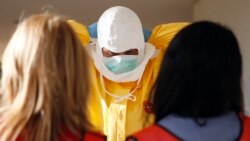Leaders in Africa and beyond have been sorely tested by an Ebola epidemic that raged through areas in West Africa over the last year and claimed more than 10,600 lives. Thanks to an unprecedented international response, the number of new infections has fallen dramatically, but the crisis isn’t over. There’s still much to do to bring the epidemic to an end, and even more work is needed to prevent a new outbreak.
The United States has helped greatly in combatting the epidemic since it was identified a year ago. In September, President Obama brought new urgency to the response with speeches and outreach at the United Nations, and setting an example for the international community with an expanded U.S. response by deploying U.S. troops to build treatment centers and help train health workers.
The African Union has been a major partner in this endeavor. Medical personnel deployed by the AU have been critical to the response. Now, an agreement between the AU and the U.S. Centers for Disease Control and Prevention, or CDC, will establish an African Center for Disease Control and Prevention. We will work together to improve all of Africa’s capacity to prevent, detect and respond to infectious disease threats.
The new center’s aim is to strengthen the capacities of African nations to understand disease threats, share information about them, and combat not only Ebola, but also HIV, tuberculosis, malaria and other diseases. Operations are expected to begin later this year with the opening of a surveillance and response unit. That will provide technical expertise to African health ministries and help coordinate response to health emergencies. The U.S. CDC will send two public health experts to the new African CDC to serve as technical advisers. We will also support fellowships for 10 African epidemiologists to help staff five regional African CDC coordinating centers that will help monitor infectious disease on the continent.
We have greatly slowed Ebola’s spread, and if the response is sustained we expect to end the epidemic in a matter of months. Lessons learned here will help African nations prevent future outbreaks and deal with other diseases, too. But the U.S. needs to continue its involvement as well.














